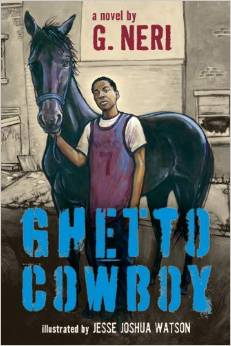 Ghetto Cowboy by Greg Neri, Candlewick, 2013.
Ghetto Cowboy by Greg Neri, Candlewick, 2013. When Cole is caught tagging the school cafeteria and his mother discovers he’s been truant for 4 weeks, she decides she can’t handle him any more and drives from Detroit to Philadelphia to leave him with the father he’s never known. Cole can’t believe she’s abandoning him but when he sees his father he’s even more astonished because his dad's a cowboy - a black cowboy in an urban neighborhood of Philadelpia. No way is Cole going to stay with a man who doesn't want him, but gradually he is sucked into life with the horses. He builds a relationship with his father, develops an affinity for a horse he calls Boo, and eventually fights to save the stables from the hands of developers and the city.
Ghetto Cowboy is skillfully written in the first-person point of view with a minimum of navel-gazing and a lot of attitude. “That horse is big, bigger than any living thing I ever seen, but I ain’t gonna let no horse show me up.” We see right there Cole’s outlook as he takes his first steps into his father’s world. Beautiful black-and-white illustrations by Jesse Joshua Watson emphasize the emotions of the story (see the one on page 10 as Cole and his mother arrive in Philadelphia) and the intriguing juxtaposition of horses and the gritty urban environment (the "ghetto" of the title). I'm guessing Jesse Joshua Watson had great fun with one particular illustration (near the end of the book) – it’s a replica of the poster for the movie “The Magnificent Seven.”
In an author’s note Greg Neri explains that the book was inspired by the urban horsemen of North Philadelphia who work to keep young boys off the street and out of trouble. They’ve been around for over 100 years. You can learn more about them on the Fletcher Street Urban Riding Club web page and on their Facebook page.
 RSS Feed
RSS Feed
